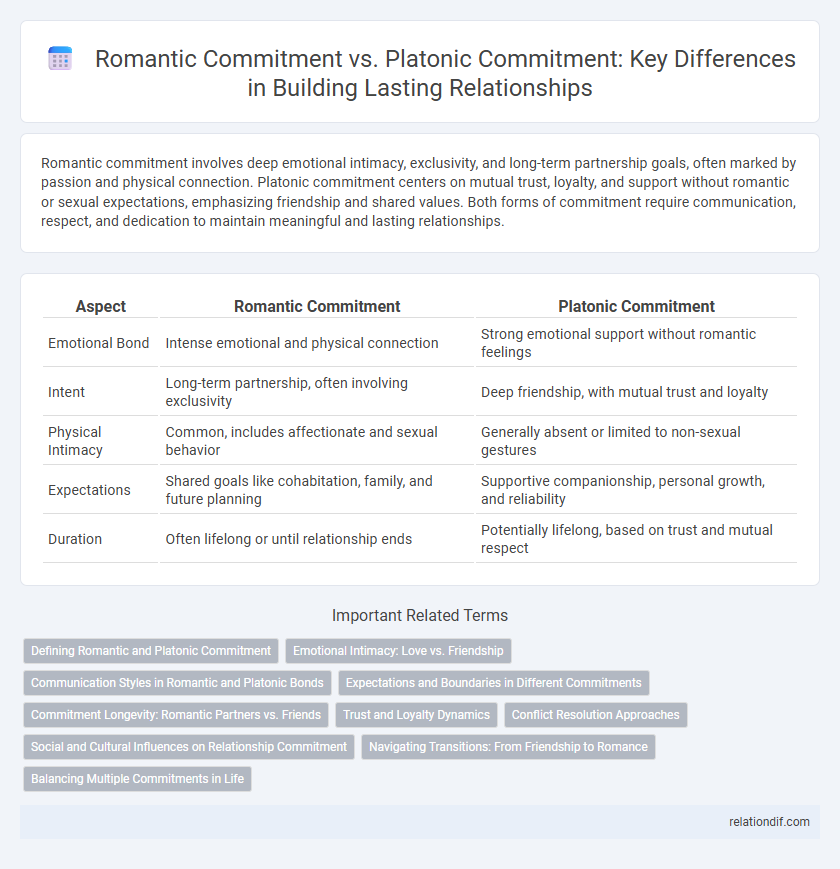Romantic commitment involves deep emotional intimacy, exclusivity, and long-term partnership goals, often marked by passion and physical connection. Platonic commitment centers on mutual trust, loyalty, and support without romantic or sexual expectations, emphasizing friendship and shared values. Both forms of commitment require communication, respect, and dedication to maintain meaningful and lasting relationships.
Table of Comparison
| Aspect | Romantic Commitment | Platonic Commitment |
|---|---|---|
| Emotional Bond | Intense emotional and physical connection | Strong emotional support without romantic feelings |
| Intent | Long-term partnership, often involving exclusivity | Deep friendship, with mutual trust and loyalty |
| Physical Intimacy | Common, includes affectionate and sexual behavior | Generally absent or limited to non-sexual gestures |
| Expectations | Shared goals like cohabitation, family, and future planning | Supportive companionship, personal growth, and reliability |
| Duration | Often lifelong or until relationship ends | Potentially lifelong, based on trust and mutual respect |
Defining Romantic and Platonic Commitment
Romantic commitment involves emotional intimacy, exclusivity, and long-term partnership focused on love and physical connection. Platonic commitment centers on deep friendship, mutual respect, and support without romantic or sexual elements. Both forms of commitment require trust, loyalty, and consistent effort to maintain strong, meaningful bonds.
Emotional Intimacy: Love vs. Friendship
Romantic commitment is characterized by deep emotional intimacy involving passionate love, desire, and exclusivity, which often fosters a unique bond demanding continuous nurturance. Platonic commitment centers around emotional intimacy rooted in trust, loyalty, and mutual support without romantic attraction, emphasizing enduring friendship and shared experiences. The distinct nature of emotional intimacy in love versus friendship influences the depth and expectations within these commitments.
Communication Styles in Romantic and Platonic Bonds
Romantic commitment often involves emotionally expressive communication, including verbal affirmations and physical touch, which fosters intimacy and mutual understanding. Platonic commitment typically relies on reliable, consistent interactions and shared experiences, emphasizing trust and support without romantic overtones. Differences in communication styles reflect the unique emotional needs and boundaries present in romantic versus platonic relationships.
Expectations and Boundaries in Different Commitments
Romantic commitment often involves heightened emotional expectations, including exclusivity, physical intimacy, and long-term partnership goals, while platonic commitment centers on emotional support, trust, and mutual respect without romantic or sexual obligations. Boundaries in romantic relationships typically emphasize fidelity and shared life decisions, whereas platonic boundaries prioritize personal space and independence. Understanding these distinct expectations and boundaries enhances relationship satisfaction and prevents misunderstandings across both commitment types.
Commitment Longevity: Romantic Partners vs. Friends
Romantic commitment often involves a higher degree of exclusivity and emotional intensity, contributing to longer-term relationship stability compared to platonic commitment among friends. Studies indicate romantic partnerships frequently endure due to intertwined life goals, shared financial responsibilities, and societal recognition of the relationship's significance. In contrast, platonic friendships, while deeply supportive, tend to experience more fluid longevity influenced by changes in life circumstances and individual social networks.
Trust and Loyalty Dynamics
Romantic commitment often intertwines trust and loyalty through emotional intimacy and exclusivity, creating a foundation for deep personal connection and long-term partnership stability. Platonic commitment emphasizes trust and loyalty rooted in mutual respect, shared experiences, and consistent support without romantic or sexual expectations. Both forms of commitment rely on reliability and honesty, but romantic relationships typically involve heightened vulnerability and exclusivity dynamics influencing trust-building processes.
Conflict Resolution Approaches
Romantic commitment often involves emotional intimacy and prioritizing partner needs, leading to conflict resolution strategies that emphasize compromise, empathy, and active listening to maintain relational harmony. Platonic commitment, centered on mutual respect and shared values, typically employs direct communication and problem-solving techniques aimed at preserving trust and long-term friendship stability. Understanding these distinct conflict resolution approaches in romantic versus platonic contexts enhances relationship satisfaction and resilience.
Social and Cultural Influences on Relationship Commitment
Romantic commitment often reflects cultural norms surrounding intimacy, gender roles, and monogamy, while platonic commitment tends to be shaped by social expectations of friendship, loyalty, and communal support. Societies emphasizing collectivism promote strong platonic bonds as vital for social cohesion, whereas individualistic cultures prioritize romantic commitment as a key aspect of personal fulfillment. Media portrayals, family traditions, and legal frameworks significantly influence how individuals perceive and enact commitment in both romantic and platonic relationships.
Navigating Transitions: From Friendship to Romance
Navigating transitions from friendship to romance requires clear communication and mutual understanding to maintain trust and respect. Romantic commitment often introduces deeper emotional intimacy and exclusivity, whereas platonic commitment centers on shared experiences and loyalty without romantic expectations. Recognizing these differences helps partners manage evolving feelings while preserving the foundation of their relationship.
Balancing Multiple Commitments in Life
Romantic commitment often involves deep emotional intimacy and exclusivity, requiring significant time and energy, while platonic commitment centers on trust and support without romantic expectations. Balancing multiple commitments in life necessitates clear communication, prioritization, and boundaries to ensure both romantic and platonic relationships thrive without causing emotional burnout. Effective time management and mutual respect play crucial roles in maintaining equilibrium between these varied commitments.
Romantic commitment vs Platonic commitment Infographic

 relationdif.com
relationdif.com